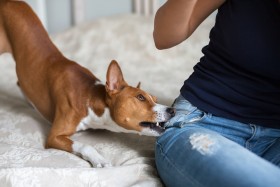Why Do Dogs Bite?

Nobody wants to have a dog that bites, but if you want to teach your dog not to bite, it’s important to first understand some of the reasons why dogs bite. There isn’t one singular reason why dogs bite, there are several factors that can contribute to them.
Territorial or Protective Behavior
Dogs can be protective of things they see as being their property — their food, their toys, their home, their owners. This type of behavior should be addressed as soon as possible. Dogs can be trained to obey an owner’s command to leave their toy from an early age. If a dog is being aggressive about their food, one way to handle it is by training them to sit or lay down while their food bowl is removed and put back so they will start to learn that if a person picks up their food bowl, it will be put back. You could also try adding a treat to the bowl when you pick it up so they will start to see how a person touching their food bowl can be a good thing.
Stress or Fear
Like many humans, dogs are often leery of strange people and unfamiliar situations. If a dog is brought to a kennel or dog sitter, they might not only be nervous about being in a new place, but also anxious about being away from their owner. Dogs might also be on edge after being startled by a loud noise like yelling, fireworks, or thunder.
It’s very important for dog owners to introduce their dog to different people and new situations starting at an early age. Visitors to your home could be encouraged to give the dog a treat so the dog will learn that visitors can be OK. If a dog has never been taken to the veterinarian before, its owner could call the vet about arranging a brief visit just so the dog will have the chance to become familiar with the vet, the office staff, and the office in general. You could consider doing the same for dog groomers, kennels, dog sitters, or any other place dogs might have to spend time away from their owners.
Redirected Aggression
Sometimes when dogs get really worked up about something, they might redirect that aggression by biting a person if they try to interfere. This commonly happens when a person tries to separate two fighting dogs. If the dog can’t bite what they originally wanted to bite, they’ll try to bite something or someone else instead. If you have to break up fighting dogs, it’s best to do so by making loud noises or by spraying them with water from a hose. If you have no other choice but to physically break up a dogfight, act quickly and try to avoid getting near the dog’s mouth.
Maternal Instinct
No matter how well behaved a dog is under normal circumstances, if the dog has recently given birth, they are prone to getting aggressive if they believe their puppies are in danger. This is a situation where biting can’t be prevented through training; it’s instinctual for the mother to want to provide her puppies with the safest environment possible. If a dog has recently given birth, it’s best to give her plenty of space and keep human visitors to a minimum for the first 2-3 weeks or until the puppies are able to be up and moving around on their own. That way, the mother will feel more at ease and can just focus on taking care of her puppies. Young children should not be allowed to handle extremely young puppies.
The Dog Isn’t Feeling Well
If a dog isn’t feeling well or is in pain, this is another situation where even a typically very well behaved dog might bite. Even if the dog knows you and you’re only trying to help it, the dog might simply want to be left alone. If a normally friendly and happy dog suddenly starts growling and snapping a lot, it might be best to take them to the veterinarian for a check-up. Even if there aren’t any obvious signs of illness or injuries, it is very possible they are acting out because something is wrong. Use caution in approaching a dog that you believe to be in distress.
Our personal injury attorneys at the Law Offices of Goodwin & Scieszka are well-versed in the injury law cases like slip and fall accident claims. Contact us if you have been injured by someone else’s neglect.






